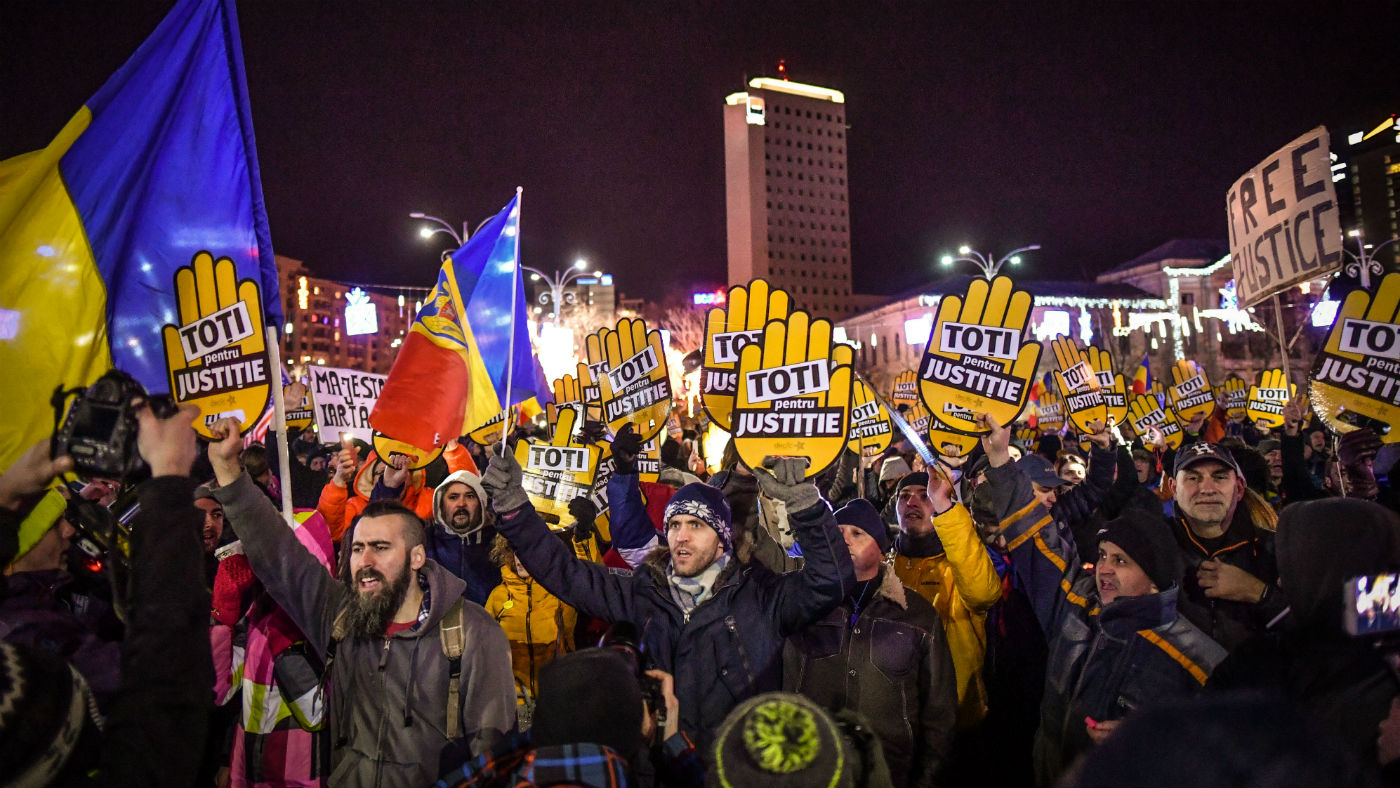Romania: thousands march against anti-corruption laws
New legislation is a threat to rule of law and judicial independence, say critics

A free daily email with the biggest news stories of the day – and the best features from TheWeek.com
You are now subscribed
Your newsletter sign-up was successful
Tens of thousands of people took to the streets of Romania’s capital Bucharest at the weekend to protest against changes to anti-corruption legislation in one of the biggest demonstrations since the fall of communism.
What is the new law?
The left-leaning ruling Social Democrats (PSD) passed new draft legislation in December that critics say will make it harder to prosecute crime and high-level corruption.
The Week
Escape your echo chamber. Get the facts behind the news, plus analysis from multiple perspectives.

Sign up for The Week's Free Newsletters
From our morning news briefing to a weekly Good News Newsletter, get the best of The Week delivered directly to your inbox.
From our morning news briefing to a weekly Good News Newsletter, get the best of The Week delivered directly to your inbox.
Under the bill, abuse of office would no longer be a criminal offence if the sums involved were less than €200,000 (£176,000). Other changes being debated include decriminalising the offence of taking a bribe on behalf of someone else, as well as lower sentences for the bribe taker.
Suspects would also be present at a victim hearing in court, reports Deutsche Welle, house searches and collection of evidence would only be possible after a suspect had been notified, video footage would be eliminated from investigations and those suspected of corruption would be exempt from investigative custody.
The changes have been widely criticised, with Romania’s anti-corruption prosecution unit, the DNA, saying they could have “a devastating impact on criminal investigations because they eliminate the indispensable legal instruments needed to investigate”.
Speaking to The Guardian, former justice minister Monica Macovei said the changes were an assault on the rule of law of a sort not seen since Romania joined the EU in 2007.
A free daily email with the biggest news stories of the day – and the best features from TheWeek.com
“There has been backwards and forwards, but this is worse,” she added.
Since it joined the European Union in 2007, Romania has been subject to special monitoring of the judiciary and the rule of law.
More than 90 Romanian former ministers, deputies and senators have been indicted by the Council of Europe's anti-corruption unit since 2006 and the country is ranked among the most corrupt in the EU by Transparency International.
However, the recent back-sliding has prompted the EU to speak out and urge Romania to do more to prevent and tackle high-level corruption.
Why have these changes been proposed?
Under existing law, leader of the PSD Liviu Dragnea is ineligible to stand as prime minister because of a conviction and two-year suspended sentence for ballot-rigging and abuse of office.
“However, if the current anti-corruption legislation is enacted, the case against him would be dropped,” says Al Jazeera, leading many to argue the new law is a personal ploy for power.
The new legislation still has to be signed into law by Romania’s centrist President Klaus Iohannis, who has spoken out against the bill, but few expect him to defy the PSD.
-
 Political cartoons for February 15
Political cartoons for February 15Cartoons Sunday's political cartoons include political ventriloquism, Europe in the middle, and more
-
 The broken water companies failing England and Wales
The broken water companies failing England and WalesExplainer With rising bills, deteriorating river health and a lack of investment, regulators face an uphill battle to stabilise the industry
-
 A thrilling foodie city in northern Japan
A thrilling foodie city in northern JapanThe Week Recommends The food scene here is ‘unspoilt’ and ‘fun’
-
 Epstein files topple law CEO, roil UK government
Epstein files topple law CEO, roil UK governmentSpeed Read Peter Mandelson, Britain’s former ambassador to the US, is caught up in the scandal
-
 Iran and US prepare to meet after skirmishes
Iran and US prepare to meet after skirmishesSpeed Read The incident comes amid heightened tensions in the Middle East
-
 Israel retrieves final hostage’s body from Gaza
Israel retrieves final hostage’s body from GazaSpeed Read The 24-year-old police officer was killed during the initial Hamas attack
-
 China’s Xi targets top general in growing purge
China’s Xi targets top general in growing purgeSpeed Read Zhang Youxia is being investigated over ‘grave violations’ of the law
-
 Panama and Canada are negotiating over a crucial copper mine
Panama and Canada are negotiating over a crucial copper mineIn the Spotlight Panama is set to make a final decision on the mine this summer
-
 Why Greenland’s natural resources are nearly impossible to mine
Why Greenland’s natural resources are nearly impossible to mineThe Explainer The country’s natural landscape makes the task extremely difficult
-
 Iran cuts internet as protests escalate
Iran cuts internet as protests escalateSpeed Reada Government buildings across the country have been set on fire
-
 US nabs ‘shadow’ tanker claimed by Russia
US nabs ‘shadow’ tanker claimed by RussiaSpeed Read The ship was one of two vessels seized by the US military